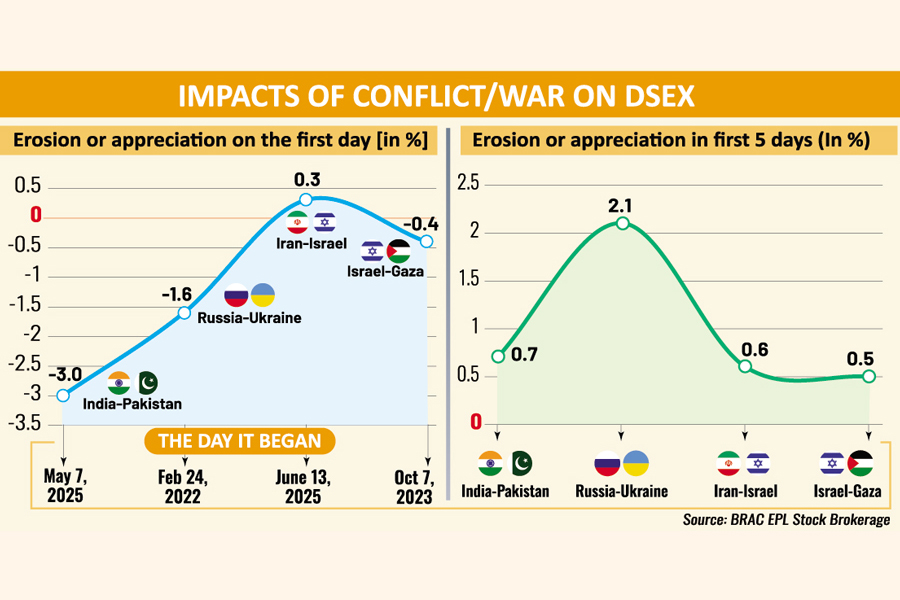Why and how Iran-Israel war may deliver a blow to equity market

Published :
Updated :

Bangladesh's equity market has not yet witnessed a significant impact of the Iran-Israel conflict, but experts and market operators fear that its escalation with the US stepping in will gradually start biting it.
There are concerns that if the conflict intensifies further, global food and energy prices will rise, increasing the inflationary pressure on the local economy.
The parliament of Iran has already approved a proposal to block the Strait of Hormuz, the execution of which will cause an increase in fuel prices.
According to a review by BRAC EPL Stock Brokerage, the market is expected to react cautiously. It says the market has absorbed information of the Middle Eastern conflict and that large-scale impact may not happen.
However, experts and market operators say disruptions in exports and imports are likely, which will eventually result in a rise in the cost of doing business, especially for export-oriented industries.
The Hormuz that connects the Persian Gulf to the Gulf of Oman and Iran lies on its north coast. One third of the world's liquefied natural gas is carried through the channel. The route also facilitates transport of almost 25 per cent of total global oil consumption.
According to the International Energy Agency, countries of South Asia, including China, Japan, India, Singapore, Bangladesh and Sri Lanka import oil directly from the Middle East.
So, any disruption to maritime traffic in the Strait of Hormuz would hamper oil imports by the South Asia countries, including Bangladesh.
Azam J Chowdhury, managing director of listed company MJL Bangladesh, said the country imports crude oil mainly from Saudi Arabia and the United Arab Emirates (EAU).
While importing oil from the UAE, ships, including that of MJL Bangladesh, are loaded in two ports -- Jebel Dhana and Fujairah, located in Abudhabi.
A ship loaded at Jebel Dhana has to cross the Hormuz canal while ships loaded in Fujairah can avoid the channel.
The government should take urgent measures so that all ships are loaded at the Fujairah port, said Mr Chowdhury.
If a ship is loaded just ahead of the blocking of the Strait of Hormuz, a huge disruption would be observed in oil imports, leading to operational impediment in oil refinement at Bangladesh's Eastern Refinery that imports 0.1 million barrels of crude oil per month.
Subsequently, the production of byproducts, such as octane and diesel, would also be hampered.
Mr Chowdhury said any disruption in oil imports would ultimately obstruct power generation and production in factories.
Echoing Mr Chowdhury, BRAC EPL said any blockade in the Strait of Hurmuz would lead to a rise in international freight costs, raising the cost of both imports and exports.
Also, shipping delays will pose challenges to meeting production timelines, especially for exporters.
Shipping costs for RMG exports may rise if tensions in the Gulf lead to rerouting of consignments, exerting pressure on Bangladesh's export competitiveness.
Meanwhile, Reuters reported that oil prices touched a five-month high before paring gains on Monday as oil and gas transit continued on tankers from the Middle East after US airstrikes against Iran at the weekend.
The Iran-Israel conflict began on June 13 as Israel made a surprise attack to destroy Iran's nuclear programme.
The US made an entry through what President Donald Trump claimed on Sunday was successful airstrikes on three Iranian nuclear sites; Fordow, Natanz, and Isfahan.
On Sunday, the DSEX, broad index of the Dhaka Stock Exchange (DSE), experienced a plunge by 71 points, but it rebounded on Monday with a rise of 17 points amid mounting tension in the Middle East.
Previously, the country's equity markets exhibited large erosions following the outbreak of the Russia-Ukraine war and the India-Pakistan conflict.
For example, the DSEX shed 149 points on the day the latest India-Pakistan conflict erupted on May7. But within five days, the DSEX recovered a loss of 33 points.
This time, BRAC EPL Stock Brokerage says, "Bangladesh's external position, inflation, and private sector activities could be stressed depending on how the situation unfolds."
mufazzal.fe@gmail.com


 For all latest news, follow The Financial Express Google News channel.
For all latest news, follow The Financial Express Google News channel.